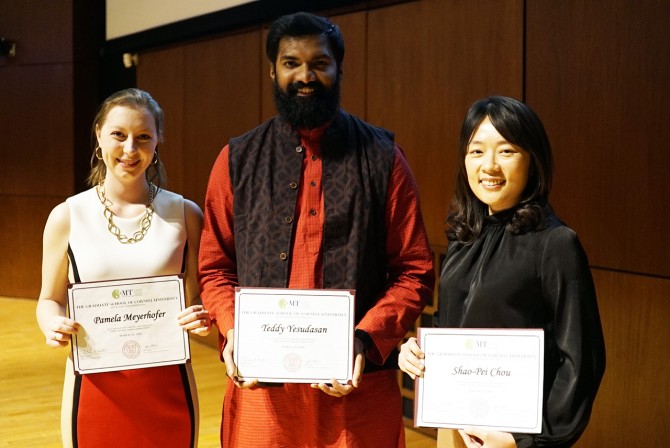Plant breeding student wins Three Minute Thesis contest
By Katya Hrichak
Teddy Yesudasan, a research master’s student in plant breeding and genetics, grew up in a place where potatoes came in one color. When he arrived in Ithaca, he was amazed at the varieties at a local grocery store.
He was so amazed, in fact, that he wrote his master’s thesis about it.
“Growing up in southern India, all I saw were white potatoes, and so when I came to Ithaca as an international student and went grocery shopping for the first time at Wegmans, I was shocked to see potatoes that came in different colors,” Yesudasan said to open his presentation at the fifth annual Three Minute Thesis (3MT) competition, held March 20 in Call Auditorium.
Alongside nine other students selected from 22 preliminary round competitors, Yesudasan had to present his dissertation research in just three minutes to a panel of non-specialist judges, staff and students from across campus. Presentations were judged on their comprehension, clarity, engagement and communication style.
His presentation, “What Makes a Red Potato Red?” earned him first place and $1,500. Second place and $1,000 was awarded to genetics, genomics and development doctoral candidate Shao-Pei Chou for her presentation, “Decoding the 2% Difference That Makes Us Human.”
After nearly 200 audience members cast their ballots, votes were tallied and the People’s Choice Award was presented to policy analysis and management doctoral candidate Pamela Meyerhofer for her presentation, “Paid Family Leave and Fertility.”
“Prior to competing, I was struggling to explain why my research was interesting to someone besides myself,” said Meyerhofer. “Having this compelling framework makes it easier to discuss and share my work.”
Chou voiced similar takeaways, adding that her public speaking and communication skills were enhanced by competing.
“I often found it’s difficult to explain what I’m working on to my friends and family. Even to other biologists, my field is new to them,” Chou said. “I made a decision last year that I was going to compete for the next [3MT] and use that as a chance to force myself to find an … excellent way to explain my research. It worked super well!”
3MT challenges research degree students to present a compelling story on their dissertation or thesis and its significance in just three minutes, in language appropriate to a non-specialist audience.
The first 3MT competition was held in 2008 at the University of Queensland, Australia, and has since been adopted by more than 600 graduate schools in at least 65 countries. This year, Cornell’s winners will compete in the inaugural Ivy+ 3MT competition, to be held April 25 at the United Nations. Yesudasan will also compete via video at the Northeastern Association of Graduate Schools annual conference in Philadelphia.
“3MT is a wonderful opportunity for students to refine their presentation skills and translate their research into language appropriate for policymakers and others in a general audience,” said Jan Allen, associate dean for academic and student affairs. “It’s always so impressive – and fun – to watch our students be so great at this!”
Yesudasan and Chou look forward to the opportunity to present on behalf of Cornell at the upcoming event.
“I consider it an honor and a privilege to be able to participate and represent Cornell at this inaugural event,” said Yesudasan. “I have always wanted to visit the UN, so representing Cornell as an international student at this event is extra special.”
Katya Hrichak is a communications assistant in the Graduate School.
Media Contact
Get Cornell news delivered right to your inbox.
Subscribe

